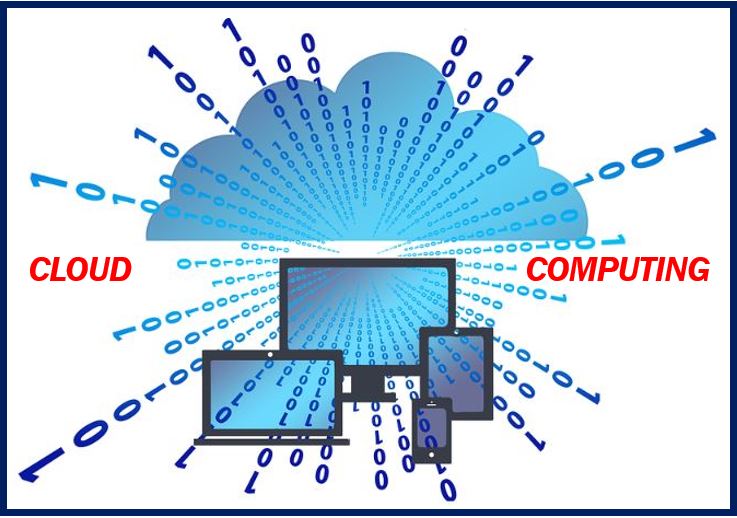Lowering operational costs, keeping data secure and ensuring employees can collaborate easily seem to be top priorities that every business has. But can they be met simultaneously? Luckily, the answer is yes, thanks to a little thing called cloud computing. Ever since they first entered the market, cloud computing services have been implemented by a growing number of businesses, from huge enterprises to small family businesses
To put it simply, cloud computing englobes both hardware and software solutions that can be delivered over the Internet, as opposed to the traditional on-premises approach that most businesses are accustomed to.
You may have heard about the cloud from using a smartphone, which provides you with the option to store all your photos and sensitive data on the cloud, to keep it away from the unwanted eyes, or to make moving them from one device to another easier. But this is only one small part of what the cloud can actually do, especially for businesses. To find out more and decide if cloud computing is the right move for your business, we must first take a look at the benefits it can bring.
 Benefits of cloud computing
Benefits of cloud computing
In time, it has been proved that cloud computing can provide a different set of benefits for every business in particular, especially because it englobes such varied and complete solutions. But behinds meeting individual needs, cloud computing manages to tackle five of the biggest issues most businesses have:
-
Lowered operational costs
One of the biggest advantages of cloud computing is that it is, for the most part, a pay-as-you-go type of service. This means that you will never have to pay for something that you are not using. Need storage? Pay only for storage. Need infrastructure? Pay only for infrastructure. This way, companies don’t need to invest capital for solutions they may only need sometimes in the future, or waste money on outdated services that need to be changed sooner or later.
-
Unlimited capacity
Companies that provide cloud computing services have servers all over the world, meaning there is no limitation for storage or processing power. If in the past, only wealthy corporations could afford the right infrastructure, now even small businesses have access to it, for a fraction of the cost.

-
Security and backup
As a business, you want to keep your data secure and away from bad intentioned people. Cloud computing services don’t only offer enhanced security and protection of their servers, but also backup and recovery solutions, which can be tremendously beneficial when relocating, or in case of computers malfunctioning.
-
Flexibility and accessibility
The problem with in-house solutions is that they often require a tremendous amount of time and money for development, testing and implementation, not to mention upgrades or changes. With cloud-based services, upscaling or downscaling can be done at a fraction of the cost, and in a much shorter period of time. At the same time, all services are available to use anywhere, at any time, the only requirement being an internet connection.
-
Faster time to market
In this competitive world, launching products to the market fast is paramount, to stay ahead of your competitors. With cloud computing services, development and implementation can be done in a matter of weeks.
Cloud computing services
There are many cloud computing services available, but this does not mean, however, that they will all be suited for your business. Some businesses need storage services, others need software and some need testing platforms. The flowing classification is meant to give you an exact idea of the services your business may need.
By ownership:
-
Public Cloud
The infrastructure of a public cloud is completely owned by the service provider, but can be used by anyone in need, be it a company or an individual. Generally, public clouds have moderate levels of security but are extremely cost-effective and easy to implement.
-
Private Cloud
As opposed to the public cloud, a private cloud means it will be owned by one single authority and is much preferred by companies working with extremely sensitive data that needs to be protected. Usually, there are bigger costs involved, but the levels of customization, reliability, and security are much, much higher.
-
Hybrid Cloud
A hybrid cloud is a combination of public and private solutions, meaning a company can store part of the data on a public cloud, and more sensitive files on a private cloud. It usually involves tremendous cost benefits, as it combines the security advantages of a private cloud, with the cost-effectiveness of a public one.
By model
-
Software as a Service (SaaS)
SaaS services give people access to cloud-based web apps, such as Gmail, Office 368, or Google Docs. SaaS solutions are usually available in the form of subscriptions (pay-as-you-go). One of the greatest advantages of SaaS services is that, because they are provided and managed by a vendor, you don’t need to install or configure them. You can simply use them as they are, whenever and wherever.
-
Platform as a Service (PaaS)
Better suited for developers, PaaS services provide them with the means to deploy all sorts of applications, without the need for an in-house server, database or development tools. Integration platform as a service (iPaaS), for example, provides a way for developers to connect different applications that were not deployed in the same environment. Although quite new on the market, PaaS has been quickly picked up by developers, especially because it provides a much better way to manage resources, both financially and time-wise.
-
Infrastructure as a Service (IaaS)
Often referred to as a virtual data center, IaaS provides storage, servers, as well as networking resources, which businesses can use for a multitude of purposes, from big data analysis to web hosting. In this situation, the vendor provides the infrastructure, and the client can use whatever operating system they like. When it comes to managing the infrastructure, the vendor is responsible for scalability, connectivity, and system provisioning, but you will need an internal system administration team. They will be responsible for managing applications, monitoring the system and dealing with firewall elements.
___________________________________________________________
Interesting related article: “What is Cloud Computing?“

